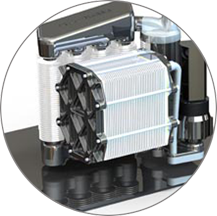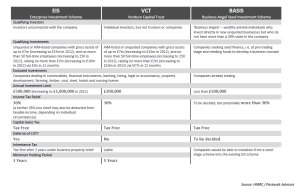ACAL Energy
Step change in fuel cell durability
A Route to Affordable Fuel Cell Vehicles
Cheshire, UK – 19th January 2012 – ACAL Energy has completed an important step in a rigorous testing programme designed to evaluate the durability of its FlowCath® fuel cell platform. The results confirm that the platinum-free liquid cathode system, FlowCath® inherently eliminates many of the causes of lost performance in both continuous operation and in auto cycling. It has the potential greatly to assist the cost-down strategies of vehicle OEMs looking to deploy fuel cells.
The announcement comes a day after the launch of a new Government-backed initiative called UKH2Mobility that will evaluate the potential for hydrogen as a fuel for Ultra Low Carbon Vehicles in the UK, and develop an action plan for an anticipated roll-out to consumers in 2014/15.
ACAL Energy has been carrying out representative drive cycle tests in response to requests from automotive manufacturers. Drive cycle issues are known to cause deterioration of conventional PEM fuel cells. To date, ACAL Energy has reached close to 2,000 hours of cumulative testing.
Reducing the cost of achieving durability is key to successful deployment of fuel cells in mass market automotive applications, and by avoiding expensive engineering designs, the Pt-free FlowCath® system will allow vehicle manufacturers to accelerate progress to supplying affordable fuel cell vehicles.
In one set of tests, a full-scale stack was subjected to extreme load and rapid thermal cycling, from zero to 1A/cm2 load cycles and from 20 to 80 degC. No measurable change in performance was seen in over 400 load cycles and 100 thermal cycles.
ACAL Energy’s technology is based on thermodynamically stable homogeneous catalysts. These catalysts have been in regular use for over three years in multiple test cells and systems, and the Company has seen no instance of catalyst deterioration throughout a battery of single cell, stack and system testing programmes.
“This is probably the most significant and valuable feature of our technology”, says Amanda Lyne, VP Strategic Business Development at ACAL Energy. “Early volume sales of fuel cell vehicles will mean that great pressure will be put on OEMs to reduce manufacturing costs. By inherently avoiding many of the durability issues seen in conventional technology, using our FlowCath® system we can improve the economic picture significantly, and speed up the mass deployment of H2FC vehicles”. The response from one auto maker was: “This result is much better than the conventional result”.
The Company continues to accumulate data on its systems, including the fully integrated stationary back up power system located at the Solvay Interox site at Warrington.
Amanda Lyne, ACAL Energy
Tel: +44 (0)1928 511581
E-mail : alyne@acalenergy.co.uk
Reinnervate

Parkwalk closes Reinnervate investment for the UK Tech Fund II
Reinnervate is a market leading company in the fast growing 3D cell culture market.
The alvetex® family of 3D cell culture products provides a flexible platform that allows technicians to quickly and easily establish better in vitro assays and models that better mimic in the in vivo growth of cells.
Lime Micro

Parkwalk closes Lime Micro investment for the UK Tech Fund II
Lime Microsystems creates single-chip multi-band, multi-standard broadband transceiver ICs with outstanding RF performance.
These transceivers support a variety of different standards and frequencies, including LTE, 3G and WiMAX.
Tracsis
Results beat heightened expectations
7 November 2011
Tracsis plc (“Tracsis” or the “Company” and with its subsidiaries the “Group”) (AIM: TRCS), a leading developer and aggregator of resource optimisation software, remote condition monitoring technology, and consultancy services to passenger transport industries, is pleased to announce its audited final results for the year ended 31 July 2011.
Highlights:
•Record revenues – revenue increased to £4,083k (2010: £2,647k) due to a combination of 14% organic growth, and £1,068k in respect of the acquisition of MPEC Technology Limited. Overall revenue growth of 54% achieved in the year
•Record profits – adjusted EBITDA* increased to £1,242k (2010: £701k) – an increase of 77%. Profit before tax increased to £1,115k (2010: £584k) – an increase of 91% – representing strong contributions from both the continuing business and acquired operations
•Strong balance sheet maintained, with cash balances at 31 July 2011 of £4.7m (2010: £2.5m), representing the share placing that took place in the year, and also significant cash generation in spite of significant outflows for the acquisition. The business remains debt free
•Acquisition of MPEC Technology Limited completed – the fourth acquisition in four years – its contribution to the enlarged Group has been immediate and significant
•Oversubscribed Share Placing successfully completed – £1.95m raised to broaden the shareholder base and provide a platform for further growth
* Earnings before finance income, tax, depreciation, amortisation, exceptional items and share-based payment charges
John McArthur, Chief Executive Officer, commented:
“Tracsis has performed extremely well in the year, achieving record levels of organic revenues and profits, and the contribution of MPEC Technology Limited (“MPEC”) has also been significant. The MPEC acquisition is Tracsis’s fourth in four years and represents a slight diversification into embedded software, but I believe it still sits well underneath the Tracsis transport umbrella. The Company’s balance sheet remains debt free and strong, with significant levels of cash in the bank as a result of continued growth and also a successful share placing. Looking ahead, whilst we are cautious about the challenging economic climate, we are excited by the prospects for the enlarged Group and are targeting further growth going forwards.”
ACAL Energy
Achieves Key Milestones
First Demonstration System now ready for installation at Solvay Interox
Cheshire, UK – 25th October 2011 – ACAL Energy has achieved key milestones in the development of its FlowCath® platinum-free liquid cathode fuel cell technology. The Company has completed the build of its first field test system, producing gross power of 3kW. At the same time the company has also achieved a new record peak performance power density of nearly 900 mW/cm2, which is a substantial improvement over the previously announced peak power record of around 600 mW/cm2.
ACAL Energy has built its first FlowCath® demonstration unit, and will install the unit next month at Solvay Interox’s chemical plant at Warrington, Cheshire. There, it will provide continuous electrical power to a remote environmental monitoring system within the manufacturing facility. The stack and regenerator sub-systems in the demonstration unit are together capable of producing over 3kW of gross electrical power and represent a significant scale-up from the previous generation test unit which produced about 1kW of gross power.
The demonstration system is part of a collaborative project that ACAL Energy is leading, co-funded by the Technology Strategy Board. The project is seen as a major step towards commercialisation for this innovative technology, and is supported by ACAL Energy’s partners: Solvay Interox, Johnson Matthey Fuel Cells, UPS Systems, the Centre for Process Innovation, the University of Southampton and the Manufacturing Engineering Centre at Cardiff University.
The new record peak power output from a single cell of nearly 900 mW/cm2 was achieved under the PEM Challenge grant project sponsored by the Carbon Trust, which is funding accelerated development of ACAL Energy’s technology for automotive applications. The latest performance results give the company even greater confidence in the ability of its technology to meet the efficiency requirements of nearly all stationary and automotive applications, while delivering a substantially higher level of durability than conventional fuel cells.
“With the successful implementation of our FlowCath® technology into a full multi-kilowatt system, ACAL Energy has passed a significant milestone in our business plan. We have shown that this new low cost and durable fuel cell technology can be packaged and operated in a form suitable for nearly all stationary power applications”, said Dr SB Cha, CEO of ACAL Energy. “To have broken new performance records at the same time is a very promising sign that we can also make this technology suitable for automotive applications. It is also a tribute to the hard work and ground-breaking innovation of the entire ACAL Energy team.”
ACAL Energy’s proprietary technology replaces the platinum catalyst on the cathode in a proton exchange membrane (PEM) fuel cell with a low cost, durable liquid chemical, so reducing the overall platinum content, as much of the platinum in conventional PEM fuel cells is used in the cathode. Fuel cell systems utilizing FlowCath® represent a clean and economically sensible alternative to diesel and gasoline generators in stationary and transportation applications requiring 1kW to 200kW of electrical power.
Amanda Lyne, ACAL Energy
Tel: +44 (0)1928 511581
E-mail: alyne@acalenergy.co.uk
UK Universities
UK three in top 10 Global Universities
Times Higher Education’s 2011-12 World University Rankings, published today, are again dominated by the US, which places 75 universities among the Top 200. But for the first time since our rankings began in 2004, the top spot is not occupied by Harvard University. Instead, the 375-year-old behemoth has relinquished first place to a young upstart, the California Institute of Technology, whose success can be attributed to its consistent results across all indicators and its attracting 16 per cent more research funding than it did the previous year. Harvard must content itself with sharing second place with Stanford University.
It is really no surprise that the US performs so well: spending more than anyone else on its universities – 2.7 per cent of gross domestic product – it gets a system that many other nations, the UK among them, aspire to emulate…..
Fund Managers Comments
EU Approves increased EIS tax breaks
The European Commission had approved the increase of the rate of income tax relief available on Enterprise Investment Scheme (EIS) to 30 percent from 20 percent and the doubling of the annual investor limits to 1 million pounds, the Treasury said.
The increase was already announced in the March budget and will cost over 100 million pounds a year…..
Tracsis
Further upbeat Trading Statement
Tracsis, a leading provider of operational planning software and consultancy services to the rail industry, is pleased to announce that as a consequence of the recent acquisition of MPEC Technology Limited (“MPEC”) together with buoyant trading in the final quarter, the enlarged group should deliver full year revenues and profits that are ahead of expectations for the year ending 31 July 2011, incorporating approximately £450,000 of revenue from MPEC since completion of the acquisition on 1 June 2011.
In addition, the directors are confident of the trading prospects in the next financial year ending 31 July 2012 with the current forward sales pipeline and order book, including new orders for MPEC, being valued in excess of £2.2m with the expectation of significant further orders being placed.
Tracsis

Parkwalk closes Tracsis investment for the UK Tech Fund II
Tracsis is a developer, supplier and aggregator of resource optimisation, data capture, and reporting technologies to the transport industry.
Tracsis provides a number of complementary services to its core software offering, including the highly acclaimed RWA Rail consultancy.
OxfordPV

Parkwalk closes OxfordPV investment for the UK Tech Fund I
OxfordPV has developed a new solar cell technology that is manufactured from inexpensive, abundant, non-toxic and non-corrosive organic materials and can be scaled to any volume.
The technology replaces the liquid electrolyte with a solid organic semiconductor, enabling entire solar modules to be screen printed onto glass or other surfaces.
Xeros
Cleans up at the Climate Week Awards
British invention uses beads to clean clothes, saving water, energy, carbon and waste
Advanced Manufacturing Park (Sheffield, UK), 28 March 2011. The first Climate Week Awards has named Xeros as the ‘Best Technological Breakthrough’ for the unique way that Xeros cleans clothes by using hardly any water. Harnessing over 30 years of research by the University of Leeds, Xeros technology has the potential to transform the way the commercial laundry market cleans clothes by offering an environmentally‐friendly alternative to conventional aqueous washing . Xeros cuts water and energy use, and reduces carbon and effluent emissions.
Xeros uses special polymer beads rather than the usual large amounts of fresh water to clean clothes. Instead a small amount of water is added to loosen clothing stains and activate the beads. Used within a special washing machine also invented by Xeros, the garments are tumbled gently in the beads. They suck dirt off the clothes by absorbing it into their molecular structure. The Xeros beads work for hundreds of washes. At the end of their cleaning life, they will be reused for other applications. For example, by the automotive industry.
Independent analysis confirms that Xeros cleans as well as normal aqueous washers, and environmental consultancy URS found its carbon footprint to be 20% lower. Xeros has raised funds at every stage of its development, most recently £4million in October 2010. The company will achieve full commercialisation later this year with a system designed specifically for the commercial laundry industry.
Bill Westwater, CEO of Xeros, said: “Xeros is delighted to win this award for Best Technological Breakthrough. It is a testament to Dr Steve Jenkins, our Chief Technology Officer at Xeros and his team, who have developed a unique cleaning technology that significantly reduces the environmental impact of cleaning clothes. The global laundry industry is worth over £60 billion per annum, and this award gives Xeros a tremendous boost as we continue down this exciting path towards commercialisation this year.”
Backed by the Prime Minster David Cameron, Xeros received the prestigious ‘Best Technological Breakthrough’ award from Lord Marland, Parliamentary Under Secretary of State for the Department of Energy and Climate Changei. The Awards are the centrepiece of Climate Week (21‐27 March), which recognises the very best of what Britain has to offer in combating climate change.
The Climate Week Awards were judged by an internationally‐recognised panel of experts, including Lord Nicholas Stern (author of the Stern Report); former Irish President Mary Robinson; eco‐adventurer David de Rothschild; Ian McEwan, best‐selling author of ‘Solar’; and Tim Smit, founder of the Eden project.
2
Climate Week CEO Kevin Steele said:“The Climate Week Awards celebrate the very best that Britain has to offer in combating climate change. They offer a powerful illustration of what can be achieved to help create a more sustainable, low‐carbon society. It’s through shining examples like these that we can help inspire others to raise their game.”
‐ ends ‐
Notes to editors:
Located at the Advanced Manufacturing Park (AMP) in Sheffield, south Yorkshire, Xeros Limited is a relatively new company that has commercialised a globally relevant technology which originally came out of pioneering work by Professor Stephen Burkinshaw at the Textile Design department of the University of Leeds. Xeros has raised over £5 million in funding from private investment and government R&D grants to commercialise the technology. Xeros was named 2nd in the top 50 “2010 Best Inventions” by TIME magazine; listed in WWF’s survey of global “Green Game‐Changers”; and selected as one of only 19 best fast‐growing “Clean & Cool” companies to go on a government sponsored mission to Silicon Valley (February, 2010). The AMP is the UK’s premier advanced manufacturing technology park, providing world‐class
advanced manufacturing technology solutions to ensure advantage for industry.
About the Climate Week Awards
The Climate Week Awards celebrate the UK’s most innovative, effective, and ambitious organisations, communities and individuals and their outstanding efforts to combat climate change. Awards were made in the following categories:
Best Technological Breakthrough for Xeros – in association with Tesco
Climate Week Hero – in association with Tesco
Most Inspirational Leader – in association with Tesco
Most Inspirational Young Person – in association with Tesco
Best Community Initiative – in association with Aviva
Best Educational Initiative – in association with EDF Energy
Best Local Initiative ‐ in association with Kelloggs
Best Initiative by a Small or Medium‐Sized Business – in association with RBS
Best New Product – in association with Tesco
Best Initiative by a Governmental or Statutory Body – in association with Tesco
Best Initiative by a Public or Uniformed Service – in association with Tesco
Best Campaign – in association with Tesco
Best Event ‐ in association with Tesco
Best Artistic Response – in association with Tesco
For further information about the Climate Week Awards, visit: www.climateweek.com/awards
About Climate Week
Climate Week is a new national occasion backed by everyone from the Prime Minister to Sir Paul McCartney to showcase the many practical ways in which we can help combat climate change..
For more information: www.climateweek.com
ACAL Energy

Parkwalk closes ACAL Energy investment for UK Tech Fund I
ACAL Energy is the world’s leading developer of low cost PEM Fuel Cells systems.
The ACAL hydrogen fuel cell technology uses a low cost liquid catalyst, reducing platinum use by up to 90%, enabling ACAL’s fuel cells to be commercially competitive with existing stationary diesel power generators in the near term and with automotive engines in the longer term.
ACAL Energy
Carbon Trust invests £1m in ACAL
A small company whose technology could cut the cost of hydrogen powered cars is to receive a £1m investment from the Carbon Trust, the government arm that pioneers carbon reduction.
Acal Energy is working with Solvay, the Belgian chemical company, and an unnamed Japanese car manufacturer, and hopes to help produce a commercial car engine by 2015.
Its technology has cut the cost of fuel cells, which convert stored hydrogen into electrical power and water, by 40 per cent, by finding an alternative to expensive platinum as a catalyst.
“This could change the world,” said Robert Trezona, research accelerator director at the Carbon Trust. “We could have a mass market car with zero emissions at the tailpipe.”
It would have similar performance to a family car, with a range of 500km, and complement small, city based battery-powered vehicles. The global industry could be worth £180bn by 2050, he said.
Acal’s fuel cell uses a proprietary liquid “catholyte” system based on commodity chemicals rather than platinum. It was invented by Andy Creeth, co-founder, who developed a similar process making detergents while working for Unilever.
Acal is based in Runcorn and employs 32 people. Apart from the Carbon Trust and its industrial backers, three venture capital funds have invested several million pounds in the company.
However, they are demanding an early return so the company has prioritised static fuel cells above automotive ones. Its first mini power plant will be installed in Warrington this year to provide backup power to a Solvay site. It hopes to sell commercially in a year’s time. S.B. Cha, chief executive, said the Trust money would allow it to accelerate research into automotive fuel cells and expand by about a third. He also sees opportunities in power generation.
Prof Trezona said fuel cell investors had “had a lot of disappointment” but the market was changing as carmakers looked to meet European Union emission targets. Daimler, Ford, General Motors, Honda, Hyundai, Kia, Renault, Nissan and Toyota have signed an agreement with the German government to produce a fuel cell vehicle by 2015. Germany and California have pledged to build a network of hydrogen filling stations.
ACAL Energy
Innovative Fuel Cell ready for installation
ACAL Energy and its development partners have put the ground works in place to install the world’s first FlowCath® fuel cell technology system to be used in a practical application at Solvay Interox Ltd, Warrington site. ACAL Energy is the developer of affordable and reliable fuel cell engines based on a platinum free cathode technology that will be a clean and economically sensible alternative to diesel and gasoline generators…..
OxfordPV
Spin-out touts printed solar cells
| Start-up company believes that its organic solar cell technology has potential to reach conversion efficiencies of around 10%. | ||
A University of Oxford, UK, spin-off company claims that its printable, dye-based thin-film solar cells will ultimately offer a much more cost-effective way to harness solar energy. |
Xeros
WWF’s “Top 20 Global Green Game-Changers”
LONDON — While politicians bicker over international action on global warming, many companies are taking the lead and cutting greenhouse gas emissions on their own. While such efforts are unlikely to be enough without strong incentives and regulation from governments, environmentalists are encouraged by how seriously some in the private sector are taking climate change.
They range from small startups based on ideas like a nearly waterless washing machine or carbon-negative cement to a “greening” of supply chains by major multinationals and big retailers…..



